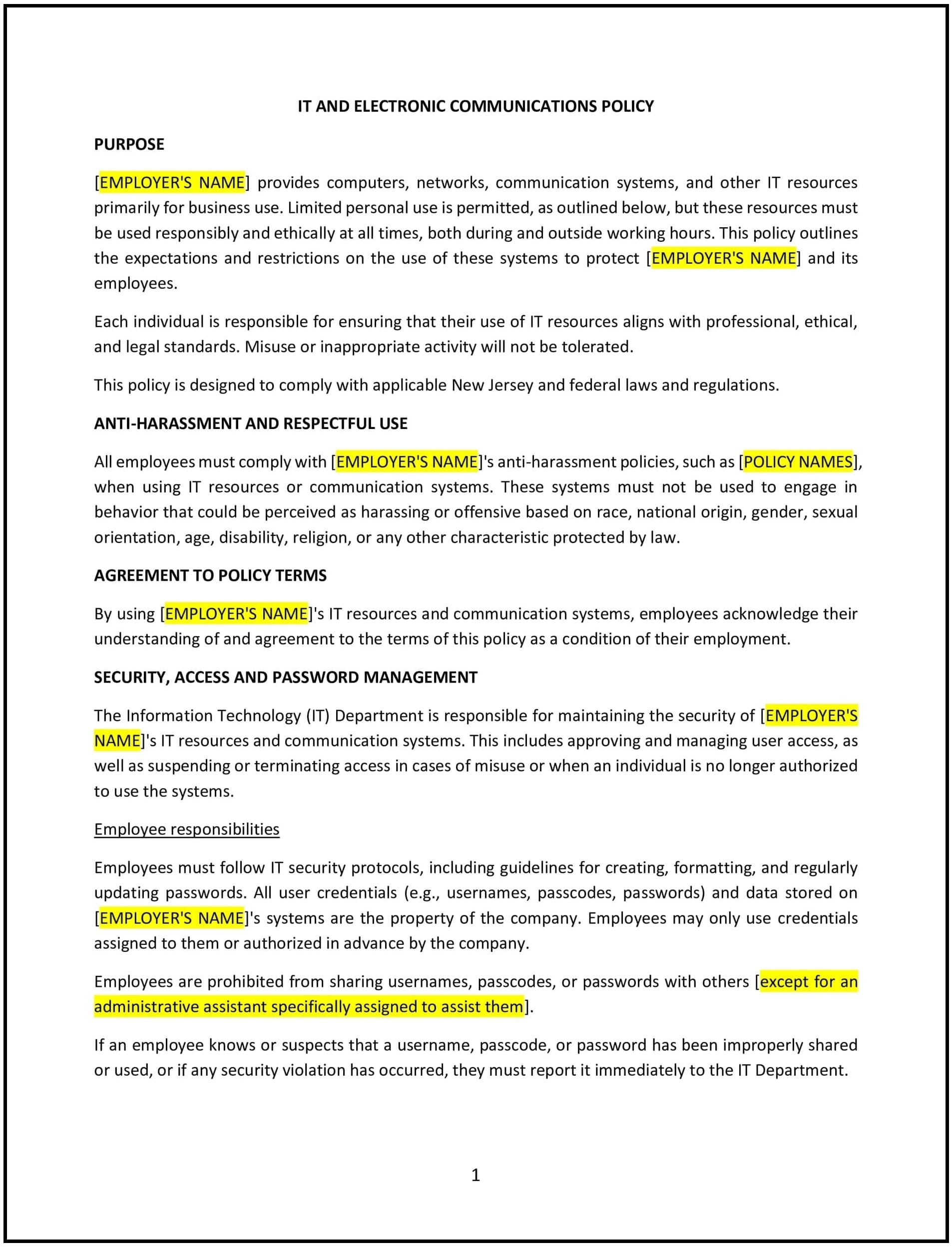IT and electronics communications policy (New Jersey): Free template
Got contracts to review? While you're here for policies, let Cobrief make contract review effortless—start your free review now.

Customize this template for free
IT and electronics communications policy (New Jersey)
An IT and electronics communications policy helps New Jersey businesses establish guidelines for the use of technology, electronic devices, and communication systems. This policy is designed to promote secure, efficient, and responsible use of IT resources while protecting sensitive information and maintaining productivity. By formalizing rules for IT and electronic communications, businesses can reduce risks, enhance operational efficiency, and support a professional work environment.
By implementing this policy, businesses in New Jersey can safeguard data, improve communication practices, and demonstrate a commitment to technological best practices.
How to use this IT and electronics communications policy (New Jersey)
- Define acceptable use: Clearly outline acceptable and unacceptable uses of IT resources, such as computers, email, internet, and mobile devices.
- Address data security: Provide guidelines for protecting sensitive information, including password management, encryption, and secure file sharing.
- Set communication standards: Establish expectations for professional and appropriate use of email, messaging platforms, and other communication tools.
- Monitor usage: Explain how IT usage may be monitored to ensure compliance with the policy and protect business interests.
- Address personal use: Specify whether and how employees may use IT resources for personal purposes during work hours.
- Provide training: Educate employees on the policy’s guidelines, including data security best practices and responsible communication.
- Communicate the policy: Share the policy with employees during onboarding and through internal communications to ensure awareness and understanding.
- Enforce consequences: Clearly state the disciplinary actions for violating the policy, including potential legal or financial repercussions.
- Review and update the policy: Periodically assess the policy’s effectiveness and make adjustments as needed to reflect changes in technology or business needs.
Benefits of using this IT and electronics communications policy (New Jersey)
This policy offers several advantages for New Jersey businesses:
- Enhances data security: Clear guidelines help protect sensitive information from unauthorized access or breaches.
- Improves productivity: Defined standards for IT use minimize distractions and ensure resources are used efficiently.
- Reduces risks: Formal rules reduce the likelihood of data breaches, cyberattacks, or misuse of IT resources.
- Aligns with New Jersey values: The policy reflects the state’s emphasis on professionalism, innovation, and community trust.
- Supports legal standards: A formal policy helps businesses align with federal and state laws regarding data protection and electronic communications.
- Builds trust: Transparent procedures demonstrate the business’s commitment to fairness and accountability.
- Encourages responsible use: Employees are more likely to use IT resources responsibly when they understand the expectations and consequences.
Tips for using this IT and electronics communications policy (New Jersey)
- Communicate the policy effectively: Share the policy with employees during onboarding and through regular reminders, such as emails or training sessions.
- Provide training: Educate employees on the policy’s guidelines, including data security best practices and responsible communication.
- Use monitoring tools: Implement software to monitor IT usage and detect potential security threats or policy violations.
- Encourage reporting: Foster a culture where employees feel comfortable reporting IT issues or concerns without fear of retaliation.
- Document incidents: Maintain records of any policy violations and the actions taken to address them, ensuring consistency and accountability.
- Review the policy periodically: Update the policy as needed to reflect changes in technology, business needs, or legal requirements.
- Lead by example: Ensure senior leadership adheres to the policy and demonstrates a commitment to responsible IT use.